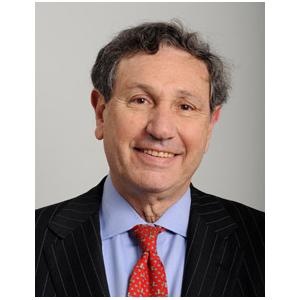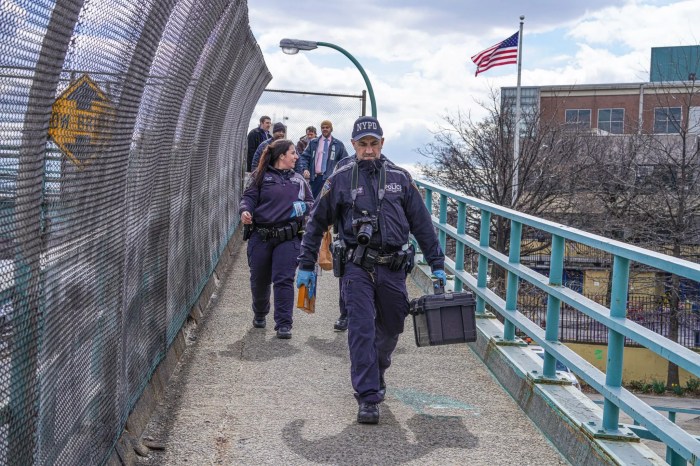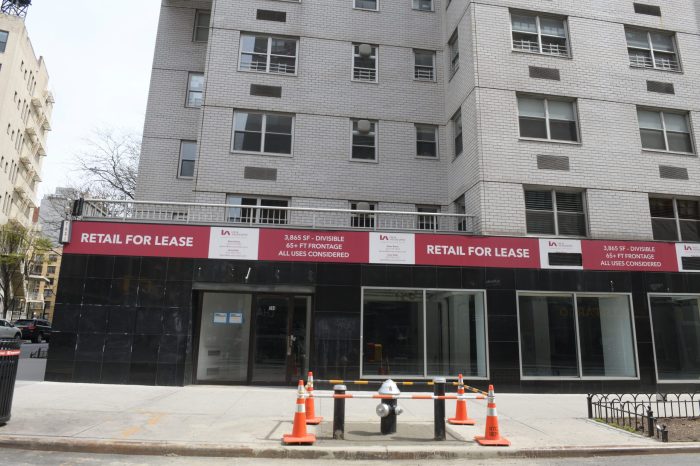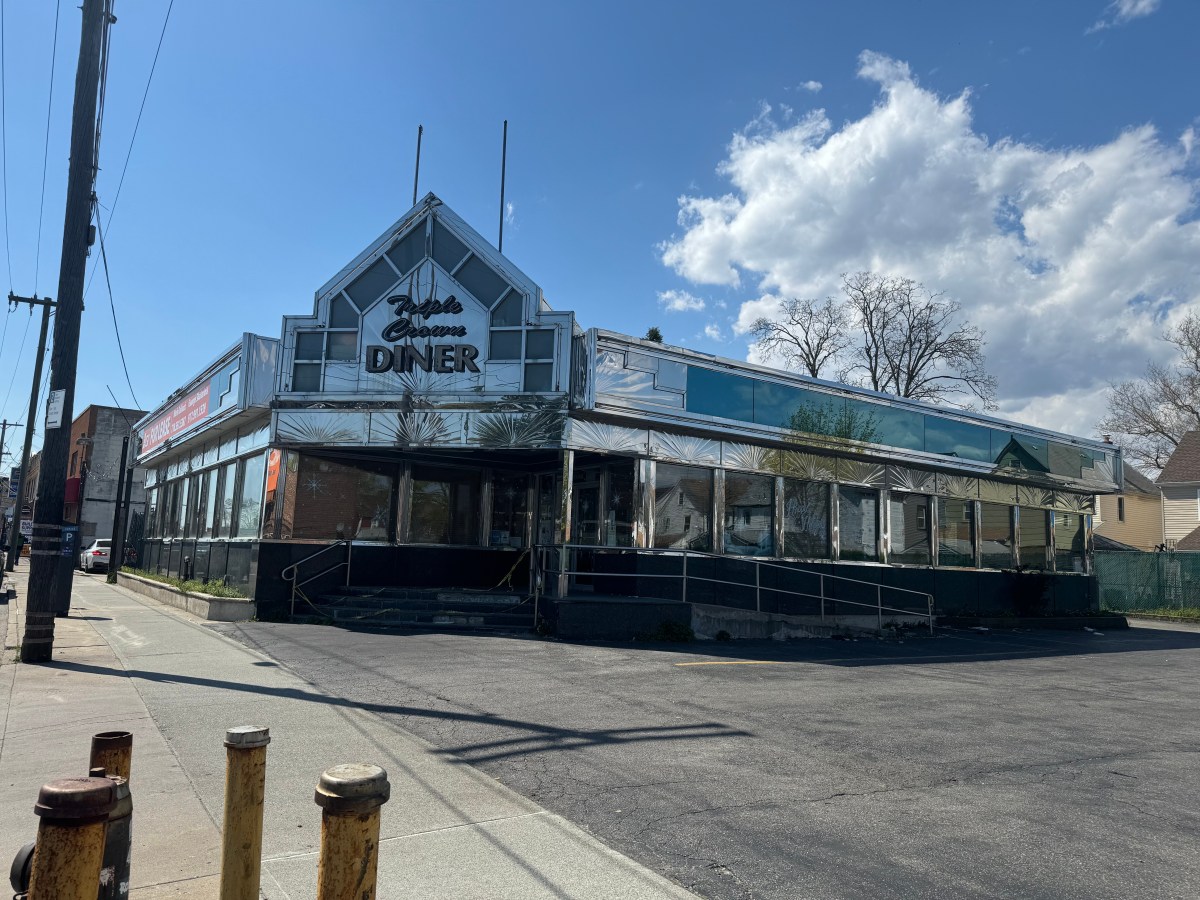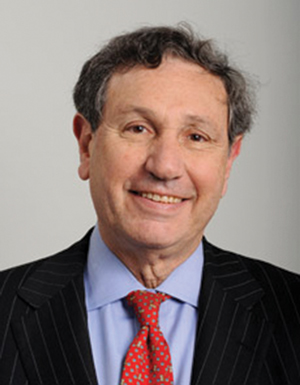
BY LINCOLN ANDERSON | Calling it “very, very personal” and “a particularly moving day” for him, Mayor de Blasio last Friday appointed his friend Carl Weisbrod chairperson of the City Planning Commission.
As Planning chief, the mayor said, Weisbrod “will have a huge positive impact on the future of this city.” That’s because Weisbrod will be a key partner in helping the mayor realize his vision of reshaping the “tale of two cities” into a new narrative of a unified, more equitable one.
“We see the City Planning Commission as a central piece of a strategy to change this city’s reality,” de Blasio declared, “to make sure that people can afford to live here and have jobs that they can feed a family on.”
The two men have been friends since first working together back in the Dinkins administration in the early 1990s. The new mayor’s confidence in Weisbrod was evident when he tapped him as co-chairperson of his transition team, helping de Blasio select many of his top administration appointments. Now, in turn, Weisbrod himself has been chosen to be one of the mayor’s most crucial agency chiefs.
In his remarks announcing the news, de Blasio repeatedly characterized it as one of the most essential appointments in his administration.
Whereas the Planning Commission under former Mayors Bloomberg and Giuliani was largely concerned with aesthetics, de Blasio said, under his administration the position will be more wide-ranging, helping shape the overall direction of the city on many fronts, not just focused on aesthetics.
Planning will take “a very different approach” than in the past, de Blasio assured. “We’re talking about an entirely different dynamic,” he said.
In the past, under Amanda Burden — who de Blasio said he respects — City Planning was “siloed,” focused on “a purer vision…of aesthetics,” he said.
Creating affordable housing will be Weisbrod’s chief responsibility, as de Blasio described it. But Planning will also have a hand in helping improve other interlinked “strands” that affect the middle class, from job creation and transportation to schools.
No one, de Blasio said, is more qualified for the job than Weisbrod, who has deep experience in New York City urban planning and neighborhood revitalization.
“Now, he’ll take on the greatest challenge of our time — the crisis of affordability and the crisis of inequality that grips this city,” de Blasio said of his new Planning czar. “Now, we’re talking about here the core of our agenda as an administration. It’s something I’m entirely focused on — this progressive core of what we came here to do. … We have to preserve and expand our affordable housing and create 200,000 units over the next 10 years.”
The focus for affordable housing will be the entire city, the mayor said, not only a few hard-hit neighborhoods, since we are experiencing “a five-borough crisis” of affordability, as he put it.
Planning will also concentrate on creating new manufacturing and industrial uses to provide “good jobs with wages and benefits a family can actually live on,” the mayor added.
Also, he said, “We have to develop strong mixed-use communities that are resilient to climate change.
“Our focus will be unrelenting, and we’re going to achieve this agenda,” the mayor vowed.
“All of that will take an extraordinary effort and we’ve chosen an extraordinary leader to help us get there,” de Blasio said of Weisbrod. The Planning commissioner will work closely with Deputy Mayor Alicia Glen in all these efforts.
Recently, Weisbrod spearheaded the Trinity Real Estate-led rezoning of Hudson Square to allow residential use and make it more of a 24/7 neighborhood.
He was the founding president of Lower Manhattan’s Downtown Alliance, the city’s largest business improvement district, and was at its helm on 9/11.
With the help of a national organization, Seedco, Weisbrod was able to get some of the first grants to help small businesses near the World Trade Center begin to recover.
While at the Alliance from 1995 to 2005, he developed a strong relationship with Community Board 1, and worked with the board to develop a plan to redevelop the East River waterfront on the Lower East Side, which was largely adopted by the Bloomberg administration.
Twenty years ago, he was the founding president of the Economic Development Corporation under Mayor Dinkins. He has often said that the agreement to build what is now the Citi headquarters in Tribeca was one of the best economic development deals he ever did because it also included the construction of P.S. 234, which fueled the residential growth of the neighborhood.
De Blasio also praised the 99-year lease Weisbrod cut with the United States Tennis Association for the U.S. Open in Flushing Meadows, saying that the planner drove a hard bargain that proved to be an excellent deal for the city.
In the 1980s and ’90s, Weisbrod famously played a key role in the redevelopment of Times Square from a seedy XXX-rated district to the family-friendly entertainment zone it is today.
Most recently he was a partner with HR&Advisors, one of the city’s most influential planning consulting firms, and was advising on the creation of a new Meatpacking District BID. (See article, Page 2.)
Weisbrod, a native New Yorker, started out as a young anti-poverty lawyer in the administration of former Mayor John Lindsay. However, during his subsequent career, he has never really been associated with affordable housing — though that will obviously be his primary focus now.
“I’m a little surprised to see myself up here,” Weisbrod said, at the press conference. Indeed, de Blasio noted that Weisbrod had appeared set on not returning to government. Yet he noted de Blasio’s “extraordinary powers of persuasion.”
“I welcome this opportunity to help shape New York City’s destiny and especially to help address the challenge of meeting Mayor de Blasio’s ambitious goal of creating and preserving 200,000 units of affordable housing,” he said.
He added he’s looking forward to working with Deputy Mayor Glen on jobs creation, and also hopes “to solidify and enhance New York City’s status as the greatest city in the world and the epicenter of culture and commerce.
“I’ve devoted most of my career to revitalizing New York City neighborhoods — Times Square, Lower Manhattan and Hudson Square — and I’m excited about doing that in neighborhoods throughout the city,” Weisbrod said. “In the neighborhoods I’ve worked in, I have learned the importance of being part of the neighborhood and not just an emissary from the city,” he noted. “I am committed to having City Planning staff deeply embedded and empowered in the neighborhoods we serve. I learned a long time ago that New York City’s greatest strengths are its neighborhoods and the rich diversity of our residents.”
Weisbrod, however, noted it won’t be possible to have “embedded planners” for every single neighborhood.
In his State of the City address this week, de Blasio, again touched on his housing plan, this time addressing “the real estate industry.”
“Let me be clear,” he said. “We want to work with the real estate industry to build. We must build more to achieve our vision. But the people’s interests will be accounted for in every real estate deal made with the city.
“In total, we pledge to preserve or construct nearly 200,000 units of affordable housing — enough to house between 400,000 and 500,000 New Yorkers — to help working people by literally putting a roof over their heads.”
Local leaders had high praise for Weisbrod.
Tobi Bergman, chairperson of Community Board 2’s Land Use Committee, said an important job for the Planning honcho will be to work out the new air rights transfer provision for Hudson River Park.
“I think everyone knows he has a track record of achievement,” Bergman said. “What I like most about him is that when you disagree with him, as will happen, a conversation begins. He looks for common ground.
“It’s a big plus that he arrives fully educated about the importance of Hudson River Park for Manhattan’s Lower West Side and about the crisis the park faces unless long-term revenue sources are secured,” Bergman added. “Using air rights from the park will require either a rezoning or a General Project Plan from the state. Either way, City Planning will be involved.”
Rich Caccappolo, C.B. 2 Parks Committee chairperson, who has been active on Hudson River Park issues, said, “I think Carl is a great choice for the position — the best choice I could think of for such a critically important role in this new administration. I don’t know of anyone with more extensive experience. I’ve always been impressed by him and enjoyed my interactions with him because he listens and he is honest, and though he generally knows more than everyone else in a discussion, I’ve never seen Carl use his advantage inappropriately.”
Madelyn Wils, the president of the Hudson River Park Trust, called Weisbrod “effective” and a “steady hand.”
“Carl is one of the most thoughtful and smartest people I know,” she said. “Our careers intersected multiple times and ways over the last 25 years. The city of New York will be in great hands as he assumes his new position as chairperson of City Planning. One of Carl’s many great gifts is his ability to be effective — a critical talent in any business or endeavor. I look forward to working with him and experiencing his steady hand of leadership.”
Douglas Durst, who is both a top developer and a longtime Hudson River Park activist, also gave highest praise to Weisbrod.
“Carl Weisbrod is an excellent choice to lead the City Planning Commission,” Durst told The Villager. “I had the good fortune to serve under him on Mayor de Blasio’s transition team. Carl’s tenure and temperament, both in and outside of government, make him uniquely qualified to implement the mayor’s vision of building the housing that our city desperately needs.”
With reporting by Josh Rogers



